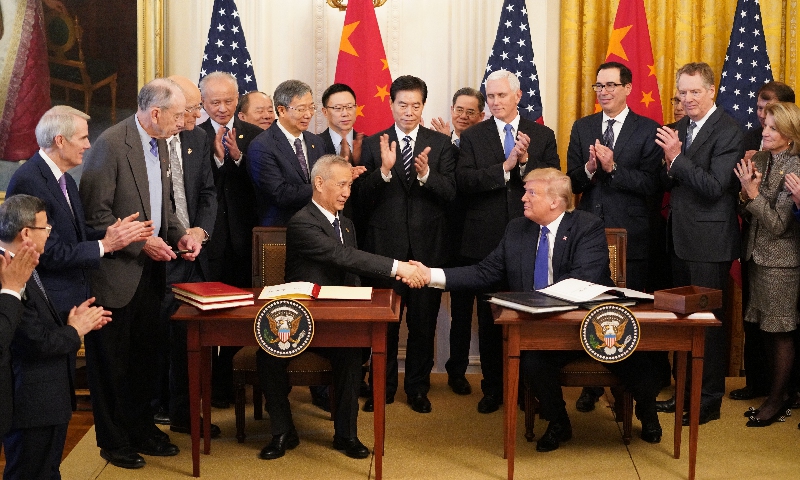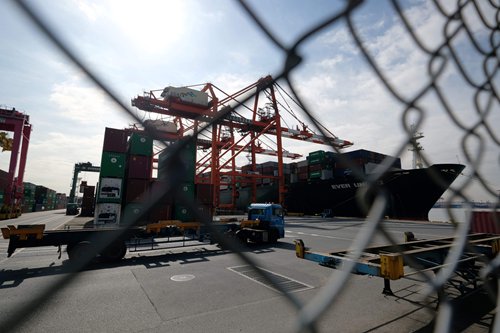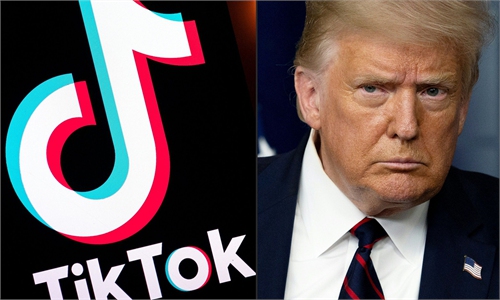
US President Donald Trump and Chinese Vice Premier Liu He, who is also a member of the Political Bureau of the Communist Party of China Central Committee and chief of the Chinese side of the China-U.S. comprehensive economic dialogue, shake hands after signing the China-U.S. phase-one economic and trade agreement during a ceremony at the East Room of the White House in Washington D.C., the United States, Jan. 15, 2020. (Xinhua/Wang Ying)
When Chinese and US trade officials hold talks over the phase one trade agreement next week as reported, they will likely highlight the progress and emerging challenges in implementing the first major deal between the two countries since US President Donald Trump came to office, Chinese experts said on Wednesday.
The two sides remain committed to carrying out the hard-fought agreement amid a tumultuous period in bilateral ties; on the other side, however, the COVID-19 pandemic and actions taken by the Trump administration against China on a range of issues from the forced closure of its Houston consulate, to Hong Kong affairs, to the crackdown of Chinese tech firms, have posed serious hurdles to the agreement's implementation, experts noted.
Under such a delicate situation, China will likely use this rare platform to reiterate its long-standing stance that the US must stop the aggressive rhetoric and behavior toward China, to create a better environment for the phase one deal and broader China-US cooperation, experts said. They added that the US must cherish what they call the only area where the two sides still have room for cooperation, and avoid all-out confrontation.
Commitment kept
Several US media reported on Wednesday that senior Chinese and US trade officials had agreed to hold a high-level meeting on August 15 to review the implementation of the phase one trade agreement, which was signed in mid-January and took effect on February 15. The meeting via video link will be attended by Chinese Vice Premier Liu He and US Trade Representative Robert Lighthizer, the Wall Street Journal reported.
No official announcement has been made by Beijing and Washington on the reported meeting. But Chinese experts who closely follow the talks said that the meeting will most likely take place, given that the agreement calls for such a review every six months.
"This is in the agreement… I think it shows that the two sides are still carrying out the deal, and is a positive sign," Huo Jianguo, vice chairman of the China Society for World Trade Organization Studies, told the Global Times on Wednesday, adding that it is a good time for both sides to exchange views on both the agreement itself and broader cooperation in trade, given the rising risks.
Since the agreement took effect in mid-February, there have been a series of hurdles from the COVID-19 pandemic to the downward spiral in bilateral ties, which sparked doubts over the feasibility and willingness to carry out the agreement. Still, in stark contrast to tensions in other areas, the two sides have shown their commitment to keep the agreement away from the hostility in other areas.
"Overall, both sides have been trying very hard [to implement the agreement], but we still have some distance from preset goals," Gao Lingyun, an expert at the Chinese Academy of Social Sciences who follows the trade talks closely, told the Global Times on Wednesday, noting that China has continued to increase its purchase of US products, despite all the challenges posed by the COVID-19 and hostility from the US.
The increased purchase of US agricultural, manufactured, energy and other products is covered by the phase one deal. A tally by the Peterson Institute for International Economics (PIIE) showed that through June, China's total imports of covered goods from the US reached $40.2 billion.
Though it was below the prorated target of $86.3 billion, the amount far exceeds China's total imports of uncovered goods from the US, which stood at $16.2 billion, the PIIE tally showed. In another sign of China's increased purchase of US products, total imports of goods from the US fell only by 1.5 percent in the first half of the year, compared to a 3.2 percent drop in overall imports, Chinese official data showed.
While US officials are likely to raise concerns about those purchases at the meeting next week, major progress has been made when taking into account the extraordinary circumstances that seriously challenged the implementation of the deal, including the COVID-19 pandemic, experts said.
"[First], China had tried very hard to overcome its domestic [COVID-19] epidemic to strive for the implementation, which is set for a two-year period… second and more importantly, the US has created a lot of difficulties during the process of implementing the agreement," Gao said.
Eas the phase one deal moves forward, the Trump administration has stepped up attacks on China, including sanctions over Hong Kong and Xinjiang, ordering the closure of the Chinese consulate in Houston, and a crackdown on Chinese tech firm TikTok.

A truck drives across the dock at the international cargo terminal at the port of Tokyo. Japan's exports in December fell the most in more than two years, official figures showed on Wednesday, dragged down by plummeting shipments to China and regional markets as weak global demand and China-US trade friction took their toll on the trade-reliant economy. Photo: VCG
Better environment"Now that both sides are sitting down, which shows the US still needs this deal, I think we should consider making it clear that if [the US] still wants to carry out this agreement, it needs to create a cooperative atmosphere for bilateral relations," Huo said.
Although Trump and other US officials have raised doubts over the phase one agreement in the wake of the COVID-19 pandemic, including threats to end the deal, they did not actually move to withdraw from the deal, underscoring the importance of the trade agreement to the Trump administration, which is known for ripping international agreements, and withdrawing from international organizations.
"From the perspective of its decoupling strategy, the US actually seems to regret the agreement, but for its own economic interests, it still hopes that the deal will help ease difficulties in the US," Huo said, adding that the agreement is also perceived to benefit Trump's voter base.
Amid the worst outbreak of the COVID-19 and a historic decline in GDP, Trump is facing a tough reelection campaign as the election is only three months away - a situation widely cited by experts as the reason behind the US' intensifying multifaceted campaign against China.
Against such a dire backdrop, the reported meeting next week and both sides' commitment to the phase one agreement underscored the important role of trade in bilateral relations, experts noted.
"In the current environment, trade is the only area where there is still room for potential cooperation," Bai Ming, a research fellow at the Chinese Academy of International Trade and Economic Cooperation, told the Global Times on Wednesday. "Both sides can find room for cooperation in trade, and that should be cherished."
However, as China continues to seek cooperation, the ball is in the US' court to preserve what has been called the "ballast" in China-US relations from falling apart, experts said.
"In the talks, China will continue to express sincerity, but questions should also be raised about the US' frivolous quibbling and hysteria, which I think has gone too far," Huo said.


